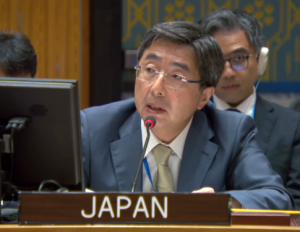Statement by H.E. Ambassador ISHIKANE Kimihiro, Permanent Representative of Japan to the United Nations, at the United Nations Security Council Open Debate on “Advancing Public-Private Humanitarian Partnership”
2023/9/14

(as delivered)
Thank you, Mr. President.
I thank the briefers for their insightful briefings.
The world faces dire humanitarian crises. The Mid Year Update of the Global Humanitarian Outlook this year reveals $55 billion required to assist 249 million people targeted, but only around $11 billion has been provided as of mid-year.
This situation clearly threatens international peace and security, necessitating urgent discussions and reinforcement of humanitarian aid, including through public-private partnerships. So, this Security Council meeting therefore provides a timely platform for this vital discourse.
Mr. President,
One central question today is how the private sector can bolster the UN's efforts to tackle humanitarian crises stemming from conflict. I would like to highlight a few successful collaborations in this regard.
Fast Retailing, the parent company of UNIQLO, has a 12-year partnership with UNHCR, under which it has provided clothing to refugees, and recent efforts include a sewing skills training project in Bangladesh, aiming to empower 1,000 Rohingya refugee women by 2025, promoting self-reliance.
NEC and Waseda University have collaborated with the ICRC on landmine detection technology, in pursuit of advancing humanitarian assistance through innovation.
Toyota Tsusho has partnered with WFP to establish a logistics training center in Ghana to enhance humanitarian aid supply capacity in West Africa.
These are fine examples of the private sector finding a nexus between its business and humanitarian needs, but the public sector can help in mobilizing private funding as well.
For example, in order to support humanitarian efforts for displaced Ukrainians in the wake of Russia’s unlawful aggression against Ukraine, the Japan Bank for International Cooperation, JBIC, has provided guarantees for the issuance of Samurai bonds amounting to 93 billion yen by the Polish Development Bank. So, these funds are designated to encompass critical areas such as medical care, education, housing facilities, and social security.
Providing the public and private sector with an opportunity to encounter each other on the global stage is also important. Last weekend, Former Foreign Minister Hayashi visited Ukraine together with representatives from Japanese private companies, including Rakuten, which had already contributed 500 generators to Ukraine, to discuss with Ukrainian leaders various issues, including Ukraine’s recovery and reconstruction.
Moreover, as a co-convenor of the upcoming Second Global Refugee Forum in December, the Japanese government also aims to inspire wider private sector involvement in improving refugee and host communities living conditions with the global refugee and displaced population exceeding 100 million and growing.
Mr. President,
I talked about facilitating the public-private nexus, mitigating risks for private funding, and providing encounters.
But in order to build a successful partnership, we also need to interact. We need to hear from the private sector more, instead of talking in a lofty manner.
Notably, the private sector is eager to showcase its support for the SDGs. For instance, the Japan Business Federation, Keidanren, consisting of 17 major Japanese companies, met with various UN agencies earlier this week to explore collaboration opportunities for advancing the SDGs. By highlighting that support for UN humanitarian actions aligns with their SDGs commitment, we can harness this enthusiasm.
The Japanese government introduced the Japan SDGs award in 2017, motivating companies to promote SDGs-related efforts by acknowledging and publicizing their contributions.
This award has in fact already recognized several humanitarian initiatives, such as Euglena, a biotechnology company that received the award in 2022 for providing food assistance to underprivileged farmers and Rohingya refugees in Bangladesh. The founder of Euglena was also in New York among the Keidanren delegation.
Mr. President,
Neglecting humanitarian needs, which may further destabilize fragile regions and exacerbate conflicts, helps no one, whether in the public or private sphere. I would like to conclude by reiterating that the Security Council must continue promoting public-private partnership solutions in addressing ever increasing humanitarian needs, together with the private sector.
I thank you.
